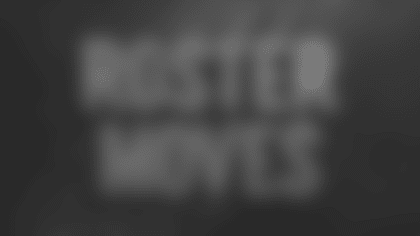CHARLOTTE — Because he's a former professional athlete, Tutan Reyes was used to ignoring the discomfort and pushing through.
But something, actually someone, told him this time was different.
The former Panthers offensive lineman — a member of the first Super Bowl team and a regular starter at guard in 2004 and 2005 — first noticed a small lump on his groin area when it was the size of a pea. Then it became the size of a marble.
"I thought it was a hernia at first," Reyes said.
It was not a hernia. It turned out to be a sign of follicular lymphoma, which was only noticed when it was in December because his friends "cursed me out and made me go get checked out."
The biopsy they took at his appointment was sent out, and Reyes went about his full life, working as a podcaster, and being a dad. He was sitting at one of his 15-year-old daughter's basketball games in December when the call he never imagined came in.
"When the doctor called, my first reaction was, 'That's messed up,' but then I proceeded to go back into the gym to watch her play," Reyes said. "I didn't want to show any weakness in front of her. Any time you hear cancer, you think it's a death sentence. But I kept the faith because I have more life to live."

The kind of cancer Reyes was diagnosed with has a good rate of recovery as long as it's diagnosed and treated early. Fortunately for him, at the behest of his friends, his was. His oncologist prescribed a schedule of chemotherapy, which saw him go in every three weeks for one of the four initial treatments.
"Naturally, I approached it like a game," he said. "OK, you've got four quarters. You attack the first one, see how your body reacts, and get ready for the second quarter."
That approach was born from a lifetime as an athlete and also his own experiences. As a member of that 2003 Super Bowl team, the inspirational messages of Sam Mills and Mark Fields during that season stayed with him. He recalled wearing that undershirt with 51 and 58 on it under his pads; he recalled being there when Mills gave the immortal "Keep Pounding" speech.
"That resonated with me," Reyes said. "Seeing the strength they had in that moment was something that inspires you."
The memories of Mills are with him every day, as he has a photo from the late linebacker's memorial (Mills died in 2005) on his desktop. Keep Pounding is more than a hashtag for Reyes, though he uses it often alongside his own, #tustrong.
"I still live by it," he said.

Reyes struggled through the early stages of treatment, acknowledging the weakness that came with it and understanding the battle he was going through. "You deal with that fatigue," he said. "You realize your body is changing, and that physically I'm not the offensive lineman I was."
And as much as he went into shock and denial at first with the news of his diagnosis, the good news that his cancer was in remission came his way in May wasn't something he was prepared for either.
"That's the amazing news, that's the news you want to hear," he said. "When the nurse told me it was my last day of treatments, I was stoic at first; I needed to see the report for myself. So once I met with the oncologist, he showed me the levels were good, and there's a sigh of relief; it starts to become real for you."
Reyes will be back at Bank of America Stadium on Sunday as a part of the team's Crucial Catch initiative. And as he's done on his Behind The Mask podcast with Takeo Spikes, Reyes wants to use his platform to encourage everyone to be mindful of their condition and to not avoid getting checked by their doctors.
"As a former athlete, you learn to deal with pain," Reyes said. "When you feel the fatigue, you grab an energy drink. When you have the night sweats, you turn up the AC. But when you're 45 years old, you have to understand that it's time to take it seriously. You're not going to know until you get checked and see your doctor on the regular.
"You come to understand that a lot of these things can be prevented if it's caught in time. And that's what we have to do, is encourage each other to get checked."















